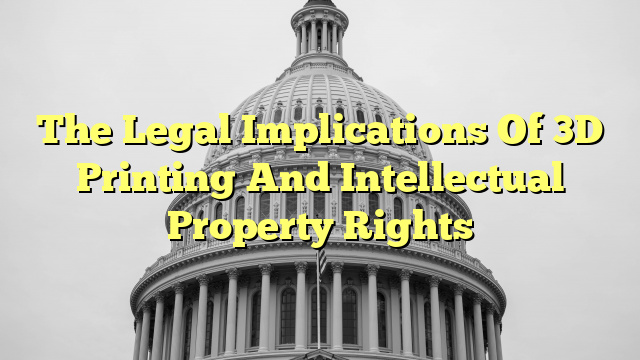3D printing is one of the most revolutionary technologies to emerge in recent years. With its potential to revolutionize the manufacturing industry, 3D printing has the potential to disrupt existing markets, create new ones, and enable the production of new types of products. As with any new technology, however, there are a number of legal implications associated with 3D printing and intellectual property rights.
Table of Contents
- What are some of the implications of 3D printing and intellectual property rights?
- What copyright and intellectual property issues arise from the growth in popularity of 3D printing?
- What is the difference between copyrights patents and trademarks in the context of 3D printing?
- Are there ethical and legal issues to consider with regard to 3D printing?
What are some of the implications of 3D printing and intellectual property rights?
One of the primary implications of 3D printing and intellectual property rights is the potential for 3D printed products to infringe on existing patent rights. In many cases, 3D printed products may be based on an existing patented design, or may include components or materials that are protected by a patent. In such cases, the creators and users of the 3D printed products could be liable for patent infringement. In addition, 3D printing could also be used to produce counterfeit goods, which could also lead to potential legal issues.
Another potential issue with 3D printing is the potential for copyright infringement. In many cases, 3D printed models may be based on existing designs, which could be protected by copyright law. In such cases, the creators and users of the 3D printed models could be liable for copyright infringement.
What copyright and intellectual property issues arise from the growth in popularity of 3D printing?
As 3D printing becomes more popular, it is likely that more and more people will begin to create 3D printed models based on existing designs. In many cases, these designs may be protected by copyright law. As a result, it is important for 3D printing users to be aware of the potential copyright and intellectual property issues that could arise from the creation and distribution of 3D printed models.
In addition, as 3D printing becomes more popular, it is likely that more and more people will begin to create 3D printed designs that are their own. In such cases, it is important for 3D printing users to be aware of the potential copyright and intellectual property issues that could arise from the creation and distribution of their own 3D printed designs.
What is the difference between copyrights patents and trademarks in the context of 3D printing?
The primary difference between copyrights, patents, and trademarks in the context of 3D printing is the scope of protection that each type of intellectual property provides. Copyrights protect creative works such as music, literature, and art, while patents protect inventions, products, and processes. Trademarks, on the other hand, protect logos, symbols, and brands.
In the context of 3D printing, copyrights may protect 3D printed models that are based on existing designs, patents may protect 3D printed products or components, and trademarks may protect logos, symbols, or brands that are associated with 3D printed products.
Are there ethical and legal issues to consider with regard to 3D printing?
Yes, there are a number of ethical and legal issues to consider with regard to 3D printing. As mentioned previously, there is a potential for 3D printed products to infringe on existing patent, copyright, or trademark rights. In addition, it is important to consider the potential for 3D printed products to be used in unethical or illegal activities, such as the production of counterfeit goods.
As 3D printing continues to become more popular, it is important for 3D printing users to be aware of the potential ethical and legal issues that may arise from the creation and distribution of 3D printed products. It is also important for 3D printing users to ensure that they are not


3D printing presents unique legal challenges to the enforcement of intellectual property rights.
The rapid advancements of 3D printing technologies raises serious legal concerns regarding intellectual property rights. It is important to understand the implications created by this technology.